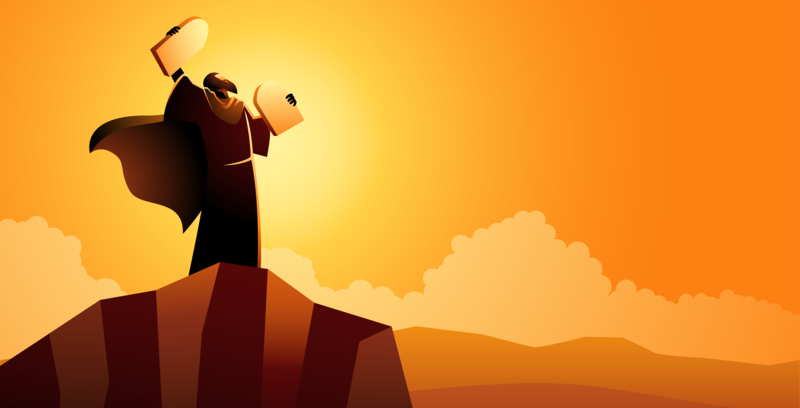
Shavuot
2024 Shavuot Programming | Online Shavuot Resources
What is Shavuot?
Shavuot combines the celebration of two major religious events, the grain harvest of the early summer and the giving of the Torah on Mount Sinai. Shavuot began during spring harvest when the Israelites brought their first crop offerings to Temple in Jerusalem 49 days after Passover. The holiday was reframed a bit after the Temple was destroyed and refocused on how Moses climbed Mount Sinai to reach God, who gave him two tablets with the Ten Commandments that were to be given to the people, the gift of the Torah. Shavuot is one of the three Jewish pilgrimage festivals in which Israelite males were historically commanded to appear before God in Jerusalem. Shavuot is observed seven weeks after Passover (on the 6th of Sivan) and, today, gives us a platform to celebrate both our agricultural roots and the study of Torah.
What are the customs and traditions followed during Shavuot?
Reading The Book of Ruth - Ruth was a young Moabite woman who chose to convert to Judaism, accepting the Torah just as the Jews accepted the Torah at Mount Sinai. For more on why we read The Book of Ruth, click here.
Ceremony of Confirmation - High school students who continued their Jewish studies beyond their B’nai Mitzvah are usually confirmed around the time of Shavuot, reaffirming their commitment to the Torah and to a Jewish life. If you have questions about confirmation of your child/children, please email us for more information.
Tikkun Leil Shavuot - The tikkun refers to a newer tradition of a multi-participant all-night study session of the Torah and the text used for it. The story goes that when the Torah arrived, the Israelites had fallen asleep waiting (instead of remaining awake in anticipation and eagerness for the word of God) and had to be awakened by Moses. To show our dedication to the Torah, after Ma’ariv, the evening service, we eat dinner, then gather and stay awake all night (unlike our ancestors!) to study Torah together. At the first sight of dawn, we read the Ten Commandments given at Sinai.
Decorating with greens & fresh flowers - Word is that when the Israelites arrived at Mount Sinai it was blooming with flowers and lush greenery. To honor the original setting of Shavuot’s origins and the spring harvest we decorate our homes with similar flowers and greenery.
The eating of dairy products - The Torah calls the land of Israel a land “flowing with milk and honey.” Many families consume dairy foods such as cheesecake and cheese blintzes to metaphorically remind us of the sweetness of the gift of Torah.
Three days of purity - The three days before Shavuot, Israelites were instructed to wash their clothes and stay ritually pure. Some modern families opt do the same during the three days before Shavuot, using them as ritualistic preparation for the holiday.
The Significance of Shavuot
Shavuot symbolizes the first covenant, or formal agreement, between God and our ancestors at Mount Sinai. We observe Shavuot to honor our Jewish beginnings and reaffirm our own contemporary commitment to Judaism and to God. The focus of Shavuot is theological, reminding us to embrace the Torah, encouraging us to study its teachings, and inspiring us with the wisdom of Jewish tradition.
Open To PJTC Members and the Larger Jewish and Jew-Curious Community!
Tikkun Leil Shavuot: On Erev Shavuot, June 11, please join us for our annual Tikkun Leil Shavuot (late night learning) program. Our theme this year will be Israel, with speakers sharing different aspects of the current state of affairs in Israel and abroad. More details coming soon!
Shavuot Services:
Wednesday, June 12 at 9:30AM | Thursday, June 13 at 9:30AM
PJTC members will be provided a Zoom link to join services. Non-PJTC members may request the link.
Getting Ready for Shavuot:
- Pressed Flower Platter as a Shavuot Centerpiece
- Elegant Cheesecake Recipe
- Why We Read the Book of Ruth on Shavuot
- Rugelach Recipe (Cream Cheese Cookies)
- Homemade Cheese Blintzes
LOOKING TO TALK TORAH FOR SHAVUOT? Check out these "TED Talks" PJTC Style, featuring educational and spiritual leaders in our community. After watching, we encourage you to share your thoughts and questions in the YouTube comments, as well as open a dialogue with friends and family to deepen the discussion.
CLICK HERE TO GO TO A YOUTUBE PLAYLIST that features the following talks.
Jill Gold Wright: The Book of Psalms and How it Reflects Human Experience
Rabbi Shana Chandler Leon: The Book of Leviticus
Susan Auerbach: Mental Health Awareness to Support Our Families & Communities
Rabbi Jason Mann: The Book of Ruth: A Journey to Redemption
Ida Unger: A Personal Journey Through the Kabbalistic Tree of Life
Rabbi Carrier: Shavuot and Kosher Wine
Song & Prayer:
Kids Corner
